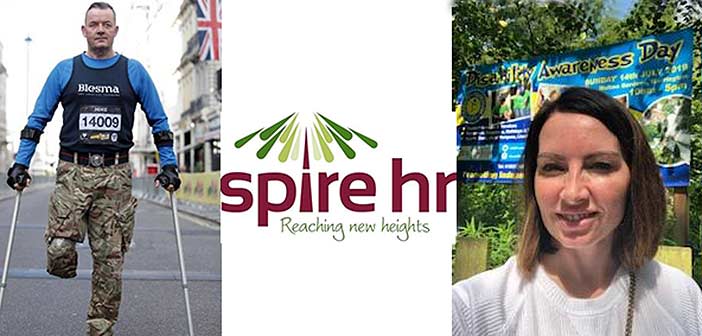By Ellen Parkin, MD Spire HR
I was happy to attend the world’s largest not-for-profit disability exhibition recently. It’s a matter close to my heart having a father with a disability:
On July 14th around 250 exhibitors descended on Walton Gardens in Warrington to promote a culture of what disabled people can do throughout their work, social and family life.
The late-great Stephen Hawking perhaps said it best: “my advice to other disabled people would be, concentrate on things your disability doesn’t prevent you doing well, and don’t regret the things it interferes with. Don’t be disabled in spirit as well as physically.”
Services and equipment that improve people’s level of independence was showcased throughout the day, which is always so fulfilling and humbling to see.
I’m constantly inspired by those that have the willpower to overcome their disability and really show the world that anything is possible if you believe in yourself!
The lead-up to the event got me thinking though.
Thinking about the seismic problem that employers can face in ensuring that their business is appropriately considering the needs of disabled staff, potential staff and their users.
Disability discrimination became illegal in 1995 (crazy how late that happened isn’t it!) and such laws have been incorporated into the highly-important, 2010 Equality Act. So what does the Equality Act say?
The Equality Act 2010 says that you must not be discriminated against because:
you have a disability
someone thinks you have a disability (this is known as discrimination by perception)
you are connected to someone with a disability (this is known as discrimination by association)
Discrimination against protected characteristics, such as a disability, can come in various forms and you need to be careful and considerate in the manner which you and your employees approach certain situations.
Dismissal based on disability (someone spelling words incorrectly due to dyslexia for example) is entirely unacceptable and can lead to expensive tribunals and lawsuits.
There are six main types of disability discrimination:
direct discrimination
indirect discrimination
failure to make reasonable adjustments
discrimination arising from disability
harassment
victimisation
Direct discrimination is quite straight forward; you treat someone unfairly because of his or her disability compared to another employee or individual without one. So deciding not to promote an employee within the business because they have a disability even though they are the best person for the role would be direct discrimination.
An example of indirect discrimination is where the employer has a process or policy wording that treats everyone in the same way but that detriments someone with a disability over someone who doesn’t. For example, advertising for a role that requires all individuals to have a driving licence could disadvantage an individual with a disability. This would only be justified if the employer was recruiting for a bus driver.
Be aware that the compensation awards for disability discrimination is uncapped and one disability discrimination case attracted an award of £242,000!
What should employers be doing then to ensure that they are working with employees with disabilities and that they get the correct care and attention?
The most obvious changes that employers think about as a ‘reasonable adjustment’ is having disabled toilets, ramps and lift facilities. However, this is not the only or necessary consideration you need to make. Every disability is different and affects people differently. The key is communication. Sit down with your employee and have a conversation about how their disability affects them on a day-to-day basis. Only then will you be able to put in place adjustments that will actually benefit the individual. It could be as simple as allowing a quiet space or area for an employee with autism or purchasing/hiring technology such as text-to-speech software.
Should you need help in introducing the best strategies for disability equality, let us know what you have in place currently – that way Spire can pinpoint the perfect place to start the conversation!
Make sure you are not caught out on disability equality. We deliver HR toolkit training to managers on this topic, amongst others, and let Spire HR put you ahead of the game with our extensive HR knowledge!
For further reading on the Equality Act please see the below link: https://www.gov.uk/guidance/equality-act-2010-guidance
For any HR help or advice call 07557 761175 or email [email protected]




